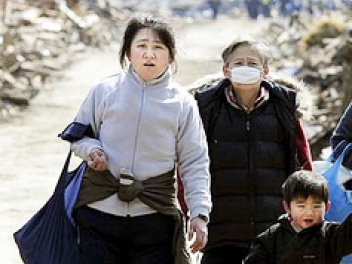 As regular readers of this blog know, older people in disasters rarely make the headlines. Japan, of course, has changed that.
As regular readers of this blog know, older people in disasters rarely make the headlines. Japan, of course, has changed that.
Many media commentators have said that the distinguishing feature of this particular disaster will be the numbers of older people affected.
A story in last week’s Guardian, “Japanese earthquake takes heavy toll on ageing population” described how dozens of elderly people were confirmed dead in hospitals and residential homes as heating fuel and medicine ran out.
Plight of older people in hospitals and nursing homes
National Public Radio’s (NPR) “Japan’s Elderly Hit Especially Hard In Disaster” correspondent, Anthony Kuhn, produced a very compelling piece of radio on the plight of older people in nursing homes and hospitals.
He describes mealtime at the House of Blessings and Longevity. The irony of the home’s name is not lost on the listener. He interviews Daisuke Hirata, the manager of another nursing home in nearby Ofunato city:
“Some people hid under tables,” he remembers. “Those suffering dementia couldn’t understand what was happening. They just squatted down or covered their heads with cushions.”
Noritoshi Tanida, a scholar at the Yamaguchi Graduate School of Medicine in southern Japan said:
“In emergency shelters, elderly people tend not to express their needs for food and water. When that happens, they can get dehydrated more easily than younger people.”
Japan has longest life expectancy
As all the media reports point out, Japan has a population with the world’s longest life expectancy. 30% of the population are over 60. This has often been reported as Japan’s great burden.
Yet as NPR’s Kuhn reminds listeners, Confucian concepts of respect for parents and ancestors are still strong, and the country’s laws put the responsibility for taking care of ageing parents squarely on their children. In north-east Japan, the median age of residents in many communities is over 50, as younger residents leave to find work in the big cities.
Not all older people of course were living in residential homes. As CNN Online reported in “Disaster is a heavy burden to bear for Japan’s elderly” quoting Sarah Harper, Director of the Oxford Institute of Population Ageing:
“In many rural areas, there’s a rural-out migration and you have communities that have high percentages of independent self-sufficient older people in their 80s and 90s.”
Older people and the recovery from disaster
AlertNet in their article, “Japan’s elderly suffer more than most in quake aftermath”, interviewed HelpAge’s emergency coordinator for the East Asia and Pacific region, Godfred Paul. He said future living conditions will dictate how well and how soon the survivors recover from the trauma.
“It is important that older people are brought back to the environment that they have lived in and see the familiar faces that they are used to,” he told AlertNet.
“The rehabilitation of older people is going to be an issue, especially the older old – there are many 80-plus, 90-plus and even centurions in Japan. The difficulty will be to rehabilitate them in an environment where they feel safe. The feeling of safety and security will be the most important thing for them after an event like this.”
The only relief for older people caught up in the Japan disasters is that, because of the positive attitude and respect for age, and the large older population, older people are likely to not be sidelined in the long-term aid response and delivery, as we have seen in previous emergencies such as in Haiti.
But right now that must feel like a small mercy.
Read more about the Japan earthquake and tsunami
Read more “Ageing in the media” blogs
